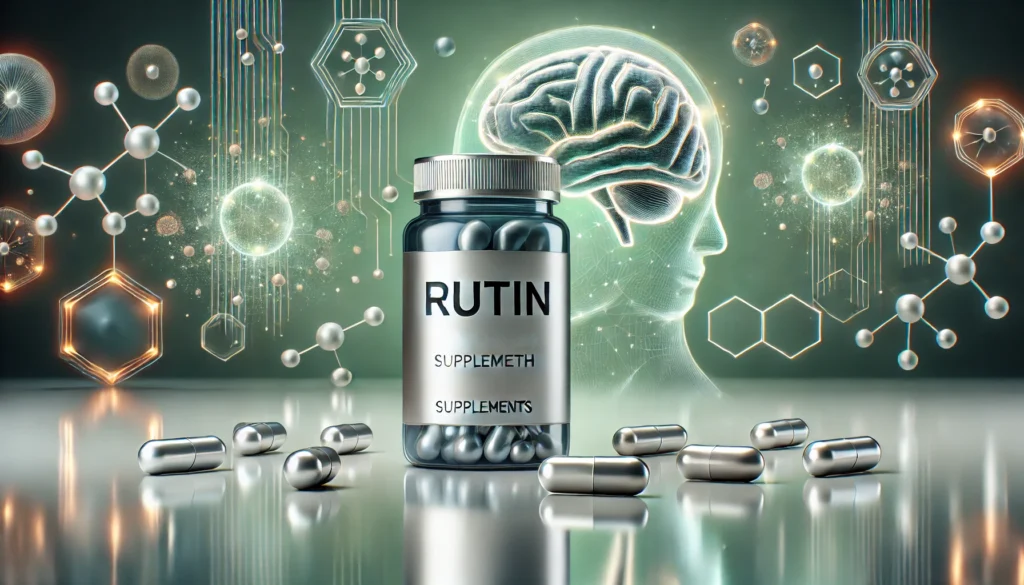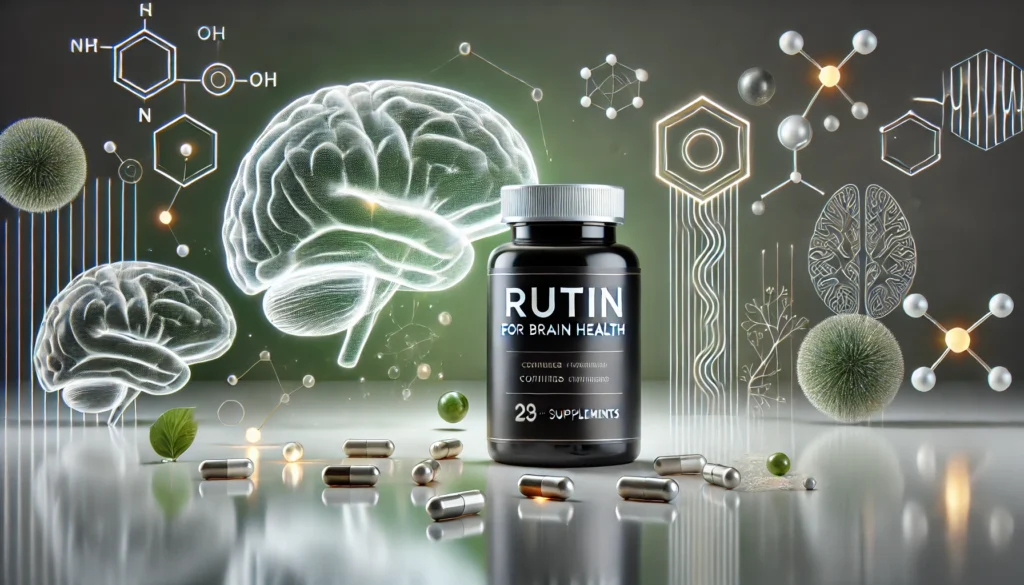Rutin, a bioflavonoid derived from plant sources, is gaining interest as a potential nootropic supplement due to its antioxidative, anti-inflammatory, and neuroprotective properties. Found in fruits and vegetables, including apples, citrus fruits, and buckwheat, rutin exhibits various health benefits related to cardiovascular health, circulation, and cognitive function. This article explores the chemistry, physiological mechanisms, potential nootropic benefits, dosing guidelines, side effects, and interactions of rutin to provide comprehensive insight for graduate-level readers.
You May Also Like:
Rutin: Potential Nootropic Benefits, Dosage, Side Effects, Interactions and Other Important Information About This Supplement is an original (NootropicsPlanet) article.
Sources of Rutin
Rutin is abundant in several plant-based foods, making it accessible through diet or supplements. The primary natural sources of rutin include:
- Buckwheat: One of the richest sources of rutin, particularly in its leaves and flowers.
- Citrus fruits: Found in the peel and pulp of oranges, lemons, and limes.
- Apples and Berries: Present in apples, blackberries, and cranberries.
- Green Tea: Contains rutin alongside other polyphenolic compounds.
- Vegetables: Onions, asparagus, and leafy greens also provide smaller amounts of rutin.
Rutin can be extracted from these sources and formulated into supplements, either alone or in combination with other bioflavonoids or antioxidants. As a plant-based compound, it is also widely available in vegetarian and vegan supplement forms.

Chemistry of Rutin
Rutin, chemically classified as a flavonoid glycoside, consists of the flavonol quercetin attached to a sugar molecule (rhamnose and glucose). Its full chemical name is quercetin-3-rutinoside. This glycoside form enhances rutin’s stability and bioavailability compared to quercetin alone.
Once ingested, rutin is metabolized into quercetin and other metabolites by intestinal bacteria. These metabolites exert most of the physiological effects associated with rutin. Its antioxidant properties stem from its ability to donate electrons and neutralize free radicals, protecting cells from oxidative stress. Additionally, rutin can chelate metal ions, preventing the formation of reactive oxygen species (ROS) and enhancing cellular protection.
Physiological Mechanisms of Rutin in the Body and Brain
Rutin exerts several physiological effects that may support its use as a nootropic supplement. The key mechanisms by which rutin influences the body and brain include:
1. Antioxidant Activity
Rutin’s most well-known property is its strong antioxidant capacity. As a scavenger of free radicals, it mitigates oxidative stress, which is a significant contributor to cellular aging, neurodegeneration, and cognitive decline. Oxidative damage in the brain can impair neuronal function, and by reducing oxidative stress, rutin may help preserve cognitive function.
2. Anti-Inflammatory Effects
Chronic inflammation is linked to several neurodegenerative diseases, such as Alzheimer’s and Parkinson’s. Rutin inhibits pro-inflammatory enzymes, such as cyclooxygenase (COX) and lipoxygenase (LOX), which reduces the production of inflammatory cytokines. By modulating the body’s inflammatory response, rutin may have neuroprotective effects, preventing the inflammation-induced damage to neurons.
3. Enhancement of Blood Circulation
Rutin strengthens capillaries and improves blood flow, particularly in the microvasculature. It enhances endothelial function and reduces the permeability of blood vessels, helping maintain optimal cerebral circulation. Proper blood flow to the brain ensures that neurons receive sufficient oxygen and nutrients, critical for cognitive processes such as memory, focus, and problem-solving.
4. Neuroprotective Mechanisms
Emerging research suggests that rutin may protect neurons from damage caused by excitotoxicity, a process where excessive stimulation by neurotransmitters like glutamate leads to neuronal injury. Rutin’s ability to stabilize calcium levels in neurons further contributes to its neuroprotective role, as calcium dysregulation is a hallmark of various neurodegenerative conditions.
Support brain health and reduce oxidative stress naturally—Choose Rutin, Available Now on Amazon!

5. Modulation of Neurotransmitters
While more research is needed in this area, early studies indicate that rutin may influence neurotransmitter levels, particularly dopamine and serotonin. These neurotransmitters are crucial for mood regulation, cognitive performance, and overall mental health. By modulating these pathways, rutin could have antidepressant-like effects and enhance cognitive clarity.
Nootropic Benefits of Rutin
Although rutin is more commonly associated with cardiovascular and vascular health, there is growing evidence to support its potential as a nootropic supplement. The following benefits are particularly relevant to its cognitive-enhancing properties:
1. Cognitive Protection Against Oxidative Stress
Oxidative stress is a major factor in age-related cognitive decline. By neutralizing free radicals, rutin helps protect neurons from oxidative damage, potentially slowing the progression of conditions like Alzheimer’s disease. Its antioxidant effects are particularly important in brain regions vulnerable to oxidative damage, such as the hippocampus, which is essential for memory and learning.
2. Support for Memory and Learning
Animal studies have shown that rutin supplementation can improve memory and learning, particularly in models of cognitive impairment. These effects are thought to result from rutin’s ability to enhance synaptic plasticity, which is crucial for forming and retaining memories.
3. Anti-Anxiety and Mood-Stabilizing Effects
Rutin’s anti-inflammatory and antioxidant properties may also benefit mood regulation. Oxidative stress and inflammation are linked to the development of anxiety and depression. Preliminary research suggests that rutin may reduce anxiety-like behaviors in animal models, possibly by modulating neurotransmitter pathways involved in stress and emotional regulation.

4. Potential to Prevent Neurodegenerative Disorders
Due to its combined antioxidant, anti-inflammatory, and neuroprotective effects, rutin holds promise as a supplement for preventing or slowing the progression of neurodegenerative diseases. While human studies are limited, its effects in animal models of Parkinson’s and Alzheimer’s are encouraging.
Dosage and Supplementation Guidelines
The appropriate dosage of rutin can vary depending on the intended use and individual health needs. General recommendations for rutin supplementation, particularly for nootropic purposes, are outlined below:
1. General Nootropic Dosage
A typical dosage range for rutin supplements is between 500-1000 mg per day. This dosage is often used to support vascular health and general antioxidant protection, but it may also provide cognitive benefits by enhancing brain circulation and reducing oxidative stress.
2. Therapeutic Dosage for Specific Conditions
For more targeted purposes, such as reducing inflammation or protecting against neurodegenerative conditions, higher doses of 1,500-2,000 mg per day may be considered. However, these higher doses should be used with caution and ideally under medical supervision.
3. Supplement Forms
Rutin is available in tablet, capsule, and powder forms, often as part of a bioflavonoid complex. When selecting a supplement, it is essential to choose a high-quality product that ensures proper absorption and bioavailability.
4. Timing and Synergy with Other Supplements
To maximize its nootropic effects, rutin can be taken alongside other antioxidants or nootropics. For example, combining rutin with vitamin C may enhance its absorption and efficacy due to the synergistic antioxidant effects.
Side Effects and Safety
Rutin is generally considered safe when taken at recommended dosages. However, some individuals may experience mild side effects, particularly at higher doses.
1. Gastrointestinal Issues
At higher doses, some individuals may experience gastrointestinal discomfort, including nausea, bloating, or diarrhea. These effects are typically mild and subside with dose adjustments.
2. Allergic Reactions
Although rare, some people may experience allergic reactions to rutin, particularly if they have sensitivities to flavonoids. Symptoms may include rash, itching, or swelling, and individuals experiencing such reactions should discontinue use and consult a healthcare provider.
3. Kidney Concerns
High doses of rutin may cause kidney irritation in susceptible individuals. Those with pre-existing kidney conditions should consult a healthcare provider before starting rutin supplementation.
Fuel your mind and elevate memory retention with Rutin—Take the first step, Buy Today!

Interactions with Other Supplements and Medications
Rutin may interact with certain supplements and medications, potentially leading to altered efficacy or adverse effects. It is important to be aware of these interactions to ensure safe and effective use.
1. Blood Thinners (Anticoagulants)
Rutin has mild blood-thinning properties, which may enhance the effects of anticoagulant medications like warfarin. Individuals on blood thinners should use caution when taking rutin, as it may increase the risk of bleeding.
2. Nonsteroidal Anti-Inflammatory Drugs (NSAIDs)
Rutin’s anti-inflammatory effects may enhance the action of NSAIDs, such as ibuprofen or aspirin. While this can provide synergistic pain relief, it may also increase the risk of gastrointestinal irritation or bleeding.
3. Iron Supplements
Rutin may inhibit the absorption of non-heme iron, the form of iron found in plant-based foods. Individuals taking iron supplements for anemia should space their intake of rutin and iron to prevent interference with iron absorption.
4. Synergy with Other Antioxidants
When combined with other antioxidants, such as vitamin C or glutathione, rutin may amplify their protective effects against oxidative stress. These combinations are often used to support overall health and cognitive function.
Risks for Individuals with Certain Health Conditions
While rutin is safe for most individuals, certain health conditions may warrant caution when using this supplement:
1. Kidney Disease
As mentioned earlier, individuals with kidney disease should avoid high doses of rutin due to its potential to irritate the kidneys. Consultation with a healthcare provider is advised before supplementation.
2. Bleeding Disorders
Due to its blood-thinning properties, individuals with bleeding disorders or those undergoing surgery should avoid high doses of rutin, as it may increase the risk of excessive bleeding.
3. Pregnancy and Lactation
There is limited research on the safety of rutin during pregnancy or lactation. Pregnant or breastfeeding women should consult their healthcare provider before using rutin supplements.
Conclusion
Rutin presents a promising nootropic supplement with potential benefits for cognitive health, memory, mood, and neuroprotection. Its antioxidant, anti-inflammatory, and vascular-enhancing properties make it an attractive option for individuals seeking natural ways to support brain function and overall well-being. While rutin is generally safe, it is essential to adhere to proper dosage guidelines and consider possible interactions with medications and health conditions. As research on rutin’s nootropic effects continues to evolve, it may become an even more integral part of cognitive health strategies.

References:
- The Potential Health Benefits of Rutin. Retrieved from: https://www.healthline.com/health/potential-benefits-of-rutin
- Rutin – Uses, Side Effects, and More. Retrieved from: https://www.webmd.com/vitamins/ai/ingredientmono-270/rutin
- What Are the Benefits of Rutin Supplements?. Retrieved from: https://www.verywellhealth.com/the-benefits-of-rutin-supplements-89508
- Rutin: A Flavonoid for Your Heart, Brain & Blood Health. Retrieved from: https://draxe.com/nutrition/rutin/
Important Note: The information contained in this article is for general informational purposes only, and should not be construed as health or medical advice, nor is it intended to diagnose, prevent, treat, or cure any disease or health condition. Before embarking on any diet, fitness regimen, or program of nutritional supplementation, it is advisable to consult your healthcare professional in order to determine its safety and probable efficacy in terms of your individual state of health.
Regarding Nutritional Supplements Or Other Non-Prescription Health Products: If any nutritional supplements or other non-prescription health products are mentioned in the foregoing article, any claims or statements made about them have not been evaluated by the U.S. Food and Drug Administration, and such nutritional supplements or other health products are not intended to diagnose, treat, cure, or prevent any disease.


